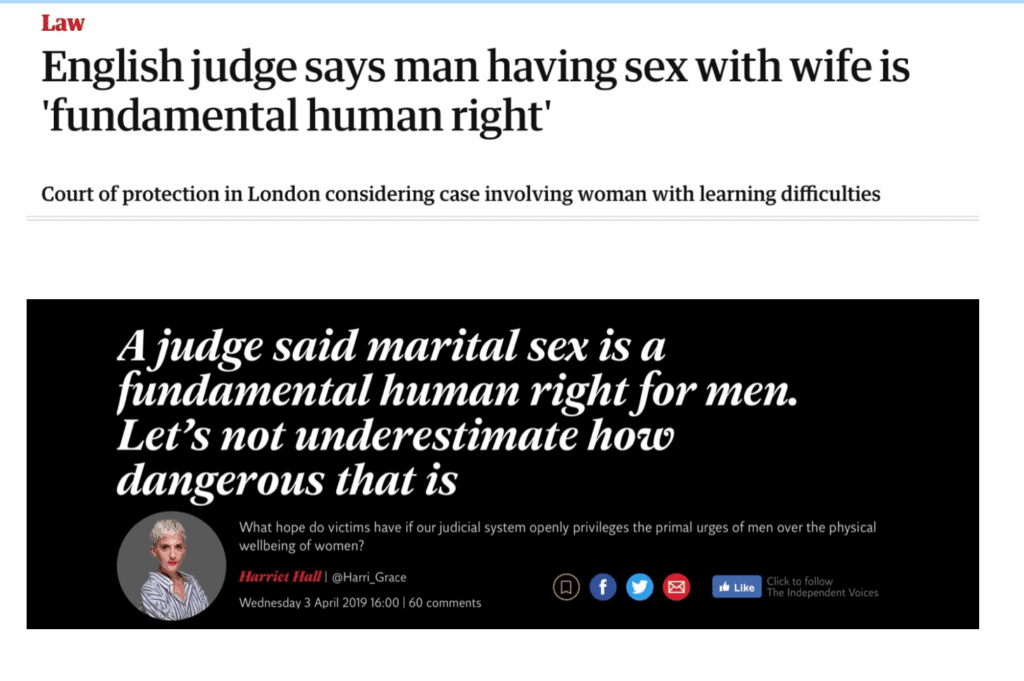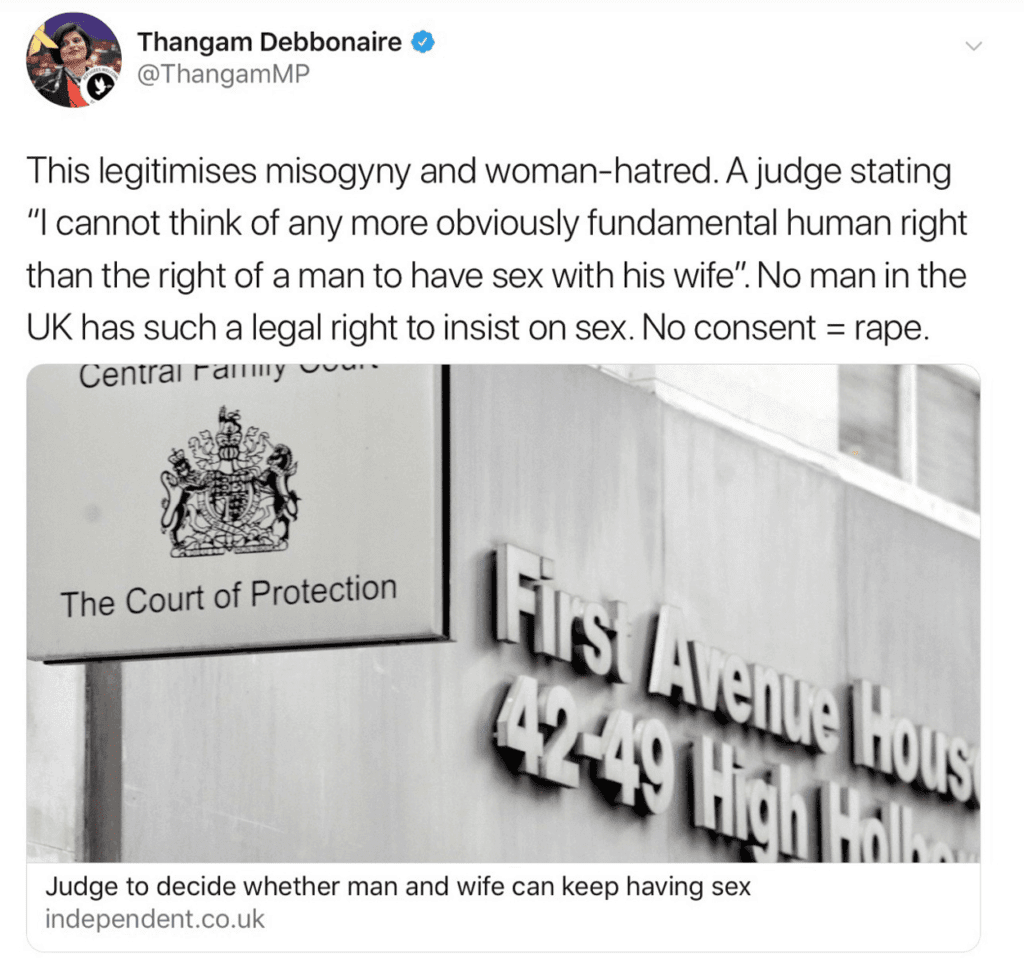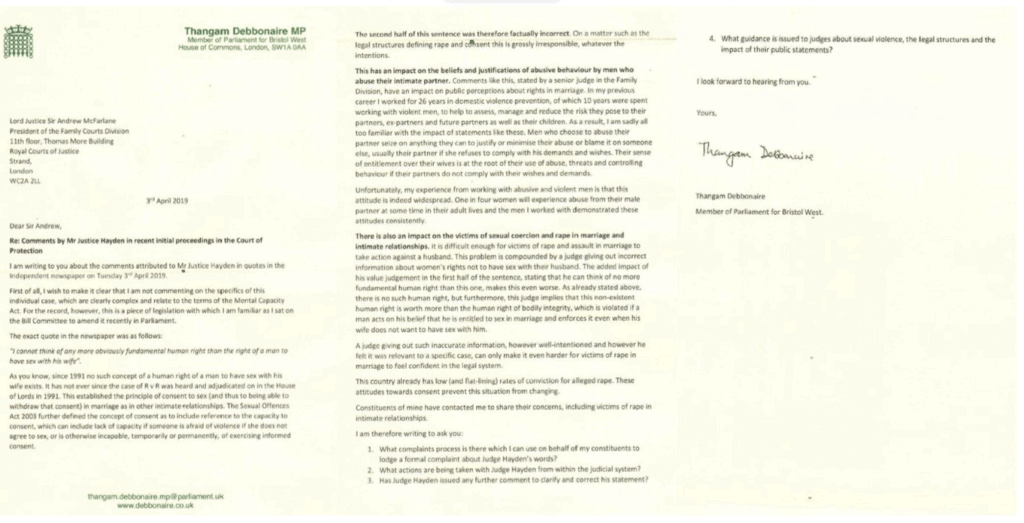This post originally appeared on Medium and is republished with thanks. It deals with the recent judgment of the Court of Protection in London Borough of Tower Hamlets v NB (consent to sex) [2019] EWCOP 27 and the consequences of sensational commentary on it.
The intimate life of a woman, who is known to the public only by the initials NB, is the subject of a case in the Court of Protection which attracted headlines earlier this year. A further judgment has recently been published, following an interim judgment published in May. This recent judgment (the July judgment) is published here and the May judgment is published here.
The July judgment is not a final judgment deciding whether or not NB has capacity to consent to sexual relations, but it contains a much fuller exploration of the facts than the May judgment and also sets out the further views of the judge, Mr Justice Hayden, on
- The legal test for capacity to consent to sexual relations, and
- The harm done to NB’s private life by media coverage and publicity of the case.
The role of the Court of Protection
The Court of Protection makes decisions about adults who lack mental capacity to make decisions for themselves. Its hearings are open to journalists and to the public, although there are strict rules which forbid publishing details which might identify the adult who is the subject of the case. For the majority of decisions, concerning both management of property and financial affairs, and welfare and healthcare, once the Court has established that an adult lacks capacity to make that decision, it will then make a best interests decision for him or her. This is not so for decisions about sexual relations, as such intimate and emotionally dominated decisions could never be made for a person by someone else — as the judge said (in paragraph 34 of the July judgment) “this is self-evidently necessary for a variety of ethical, moral and legal reasons.” All that the Court can do is decide whether or not someone has capacity to consent to sexual relations for him or herself. If s/he does, s/he is free to make his or her own decisions about this aspect of his or her own private life. But if s/he does not have capacity to consent to sexual relations, then all the Court can do is make orders with a view to preventing opportunities for sexual contact and decision-making arising in that person’s life.
It is obvious that this is a drastic interference with an individual’s human right to private and family life, and that a decision whether or not someone lacks capacity to consent to sex has profound consequences for that person and for those close to them, or responsible for their welfare. Understanding the legal test of capacity and weighing up the evidence and making a decision about any individual involves walking a tightrope between two potentially harmful conclusions: depriving an adult who has capacity of freedom and self-direction in an important aspect of their private life, or leaving an adult who does not have capacity exposed to the risk of sexual assault and rape. As the judge said in the July judgment in NB’s case (paragraph 27)
“The omnipresent danger in the Court of Protection is that of emphasising the obligation to protect the incapacitous, whilst losing sight of the fundamental principle that the promotion of autonomous decision making is itself a facet of protection. In this sphere i.e. capacity to consent to sexual relations, this presents as a tension between the potential for exploitation of the vulnerable on the one hand and P’s right to a sexual life on the other.”
And, as he emphasised in both his written judgments, and, at the hearing on March 29, in the words which “ignited” headlines, to deprive an adult of the opportunity of making decisions about sexual relations
“is depriving them of a fundamental human right. Additionally, I repeat, AU’s Article 8 rights [the right to a private and family life expressed in Article 8 of the European Convention on Human Rights] are also engaged in this context. He too has a right to a sexual life where there is true consent and mutual desire.”
How a judge decides whether a person lacks capacity to consent to sexual relations
The Mental Capacity Act 2005 starts from the presumption that every adult has capacity to make every decision in their life, from the most trivial to the most weighty, and from the most intimate to the most public. A person who lacks capacity is someone who is unable to make a specific decision at a specific time because of an impairment of or a disturbance in the functioning of their mind or brain. Being unable to make a decision is further defined as being unable to understand, retain, use or weigh information relevant to the decision, which includes information about the reasonably foreseeable consequences of deciding one way or another, or failing to make a decision at all, or as being unable to communicate a decision.
As the case law has developed, both before and since the Mental Capacity Act 2005 came into force, at its heart capacity to consent to sexual relations requires a simple test of
“sufficient rudimentary knowledge of what the act comprises and of its sexual character to enable [him or] her to decide whether to give or withhold consent”
“Sufficient rudimentary knowledge of what the act comprises” — as evident in pictures from brothel graffiti in Roman Pompeii to the phallic aubergine emoji used in modern social media
But there has been continuing debate about two important aspects of the legal test:
- What is the information relevant to a decision whether to say “yes” or “no” to sex? As reflected in the psychiatric assessment of NB carried out for the court in early 2019, it had been established in decided cases that this “relevant information” includes the fact that sexual intercourse can lead to pregnancy, and the fact that it carries the risk of sexually transmitted disease.
- Is the test of capacity to consent to sexual relations “person-specific” or “act-specific”? One aspect of this discussion is a desire for consistency of approach between the civil law relating to mental capacity and sexual offences liable to prosecution in criminal law. In ordinary language, and in life, it seems instinctive to say that every decision about sexual relations is person-specific in that each decision is always a decision about sexual relations with a specific person, not a self-assessment of capacity to consent, irrespective of the identity of the other person involved. As Lady Hale said in the criminal case of R v Cooper [2009] UKHL 42
“ …it is difficult to think of an activity which is more person and situation specific than sexual relations. One does not consent to sex in general. One consents to this act of sex with this person at this time and in this place.”
In the Court of Protection, however, it has been established for some time that the test of capacity is not person-specific, but “a question directed to the nature of the activity rather than to the identity of the sexual partner”.
The July judgment in NB’s case is the latest development in this debate. The legal test, as set out in the Mental Capacity Act 2005, and further articulated in decided cases, applies universally to any adult lacking capacity. This might be a person like NB, who has had a long monogamous married life with an active sexual relationship with the same partner, and whose capacity to consent has never previously been doubted, or it might be (as it quite frequently is) a young adult at the outset of sexual maturity without any sexual experience or established relationship. In NB’s case, where the possibility of future sexual relations is likely to be only with her husband, the judge thought it artificial to assess her capacity in general terms and to conclude that her inability to understand the connection between the physical act and pregnancy, and between the physical act and sexually transmitted disease meant that she lacked capacity to consent.
The history of the case
The question of NB’s capacity to consent to sexual relations first came to public attention in early April 2019, with publication of news stories carrying headlines like those below. As the judge observed in the published judgment of 19 July, “the case suddenly ignited a great deal of media coverage”. All of it appears to have been based on the same agency report from an experienced journalist present in court at a hearing a few days earlier, on 29 March 2019.

These quoted words provoked a great deal of critical reaction, both from journalists in the mainstream media and from campaigners and public figures such as Thangam Debbonaire MP, who not only tweeted this on 2 April:

but also published a letter she had sent to Lord Justice McFarlane, President of the Family Division and the Court of Protection:

On 6 April the Transparency Project published a more legally-informed explanation of the case here. It was obvious to any lawyer commentating on the case that anything the judge had said about AU’s rights to sex with his wife was in the context of an intense focus on whether or not she could herself consent to sex.
The interim judgment was published on 14 May, and the Transparency Project also published an explanation of this, which I wrote here, and which led to a discussion of the case with Joshua Rozenberg on Radio 4’s Law in Action on 11 June, available via the link here (between 8mins 5secs and 15mins in the broadcast).
When asked by a number of lawyers on Twitter to comment on the May judgment, and reflect on her original response, Thangam Debbonaire strongly reiterated her view that what the judge had said was wrong and that her critics were missing her point. She did not respond at all when asked if she had had any reply to her letter to Lord Justice McFarlane. Neither she nor any other influential commentator on the case has made any further comment in the light of either of the reasoned narrative judgments which have now been published.
The facts
NB is a middle-aged woman with general global learning difficulty and an impairment in her facility to communicate with others. Neither she nor her husband, AU, was born in the UK. They live in the London Borough of Tower Hamlets, a borough in which 69% of the population at the 2011 census identified as belonging to minority ethnic groups, the largest of which is Bangladeshi, constituting 32% of the population. A passage in the evidence referred to in the judgment described NB as habitually chewing betel nut, a fact which suggests that she is Asian in origin. NB came to live in the UK in 1985. She married AU in 1992, but he did not then have permission to enter the UK. After a period when AU and NB lived together abroad, and following a series of applications to the Home Office, AU and NB came to London in 1997 and lived with NB’s parents. They had a daughter in 1998. Documents from AU’s immigration records provided evidence of NB’s affectionate attachment to AU and of her understanding of “the lasting nature of marriage … as a committed sexual bond between a man and a woman.”
In October 2014 Tower Hamlets adult social services first became aware of the possibility that NB might lack capacity to consent to sexual relations, as a consequence of something she said to her dentist. The local authority instigated a safeguarding enquiry and arranged for NB’s assessment by a clinical psychologist. The local authority felt that on the evidence it had of the couple’s home life after this assessment, it was unlikely that NB was being forced into a sexual relationship with her husband, and that the case was finely balanced as between NB’s limited capacity and the fact that she had been long married and had a very clear attachment to AU. And, as the judge commented in both his written judgments
“this couple found themselves in an invidious situation, in which their private and sexual life was being scrutinised by a variety of professionals”
The local authority filed an application in the Court of Protection in October 2018, asking the Court to determine whether or not NB had capacity to consent to sexual relations. NB’s own interests were represented by the Official Solicitor, as is usual in Court of Protection litigation. Her husband AU was also made a party to the case, but did not instruct lawyers to represent him. Between October 2018 and the first newspaper reports in April 2019, NB was subject to a wide-ranging assessment of her mental capacity by a consultant psychiatrist, who concluded that NB lacked capacity in a number of areas of decision-making, including her capacity to decide where to live, and make decisions about with whom she had contact, and her capacity to consent to sexual relations, of which “she had an extremely basic understanding of the physical act”. The psychiatrist also considered that it would be detrimental to NB’s psychological well-being to separate her from her husband, towards whom she had a definite attachment and affection.
On 29 March 2019, the lawyers acting for the local authority and for the Official Solicitor, and AU himself attended court. They had reached an agreement between themselves that the case should be dealt with by AU giving a formal undertaking to the court that he would abstain from sexual intercourse with his wife. As breaking an undertaking to a court can lead to imprisonment for contempt of court, the judge did not think it was right to deal with the case in this way
“My concern was that if these were the proposed answers to the challenges presented by this situation it may be that the wrong questions were being asked.”
This is a comparable approach to that of the Court of Appeal in an entirely different Court of Protection case, where a woman had been imprisoned for contempt of court for failing to comply with an order relating to her elderly mentally incapacitated brother, and where the Court of Appeal questioned whether it could be said to have been in the brother’s best interests to make a decision which could only be achieved by sending his sister to prison.
The hearing on 29 March was listed for directions, and not for a final decision. As the judge was not prepared to accept the proposed undertaking from AU, another date had to be arranged for further legal argument. In the meantime, AU was encouraged to seek legal representation so that he could participate more fully in the argument. But as described in the May judgment, AU’s embarrassment and anxiety, exacerbated by the media coverage following the 29 March hearing, led him to withdraw from any involvement in the case and to leave his (and NB’s) home.
The law
The judgment published on 19 July 2019 followed a decision of the Court of Appeal on 11 June 2019 in another case considering capacity to consent to sexual relations: B v A Local Authority [2019] EWCA Civ 913, and the two decisions refer to each other. The judge in NB’s case gave the advocates the opportunity to review and develop their arguments in the light of the Court of Appeal’s decision. Reading both judgments together, it is clear that the legal test of capacity to consent to sexual relations remains general and issue specific, rather than person or event specific, although the judge said that
“The terminology which bedevils this area of law obscures rather than illuminates many of the issues [and] risks becoming an obstacle to clear thinking”
And that
“The applicable criteria in evaluating capacity to consent require to be rooted within the clear framework of [the Mental Capacity Act definition of being unable to make a decision]. The individual tests are to be regarded as guidance ‘to be expanded or contracted’ to the facts of the particular case. They are to be construed purposively, both promoting [NB’s] autonomy and protecting her vulnerability.”
He was unenthusiastic about the “tepid” legal arguments of both the local authority and the Official Solicitor, both of whom argued that it was impractical to “tailor” the circumstances or components of the legal test of incapacity for individual incapacitated adults, and emphasised that such an approach was fundamentally different from a “person specific” test, and that a “more nuanced” approach which took into account the realities of NB’s personal life, was consistent with existing case law. He concluded that:
“The Court of Protection deals with human beings who, for a whole variety of reasons, have lost or may have lost capacity. This may be temporary, permanent, fluctuating or limited to a constrained sphere of decision taking. A declaration of incapacity … should not impose sameness or uniformity. The personality and circumstances of the incapacitous are as rich, varied and complex as those of anybody else. All this requires to be taken into account in evaluating capacity in every sphere of decision taking . . . we must be vigilant to ensure that the applicable tests do not become a tyranny of sameness, in circumstances where they are capable of being applied in a manner that my properly be tailored to the individual’s situation.”
The media issues
In the July judgment, the judge quoted what he had said in his May judgment about “sententious” and “irresponsible” media coverage, and how the publicity generated about the case had “frightened AU very considerably, leading him to believe that he was likely to be sent to prison”. In the July judgment (paragraph 16), he said:
“This is a very troubling feature of this case. It raises questions concerning the protection of the vulnerable in media coverage, which will require to be addressed by the ad hoc Court of Protection Rules Committee. It has exacerbated the difficulties in an already challenging situation.”
What next?
As far as NB herself is concerned, the judge considered that the weight of the evidence suggested that she did have capacity to consent to sexual relations. He said that the local authority might wish to consider a reassessment of her capacity in the light of his judgment, but that would also depend on whether the marriage of AU and NB survives.
As for the harm caused to AU and NB’s personal lives by the publicity of the case, there is no obvious answer to the problem which NB’s case has acutely raised. Is it possible to reconcile openness in the courts, and specifically in the Court of Protection which has moved firmly towards greater transparency and public accessibility in recent years, with protection of people who lack mental capacity? From a lawyer’s point of view, it is understandable that the judge in this case should have been surprised and concerned by the way in which a few words spoken in the course of a hearing for directions should have become a sensational headline “notwithstanding that no argument had been heard and no Judgment had been delivered.” In traditional law reporting, only a written narrative judgment, and, in important cases reported by the official Law Reports, a summary of the advocates’ legal arguments, would be published and read as having legal authority.
None of the media reports of the 29 March hearing made it clear that the quoted words, assuming that they were accurately quoted, were no more than part of a discussion between the judge, the advocates for Tower Hamlets and for the Official Solicitor, and AU himself, and did not constitute any kind of ruling on the law. Should a judge be required to take care to ensure that nothing he or she says, even in a hearing of this type, can be quoted out of its context, lest it “reinforce dangerous attitudes”, in the words of Thangam Debbonaire MP? Even if this degree of vigilance over extempore speech was realistically possible, the interests of justice and of the people involved in a case must surely take priority over anxiety about quoted words being taken out of context. Or should the responsibility rest with influential commentators to better understand and explain the context, and not to seize on fragments like this and sensationalise them in headlines and social media postings? Their reactions appear to be rooted in a resilient but but inaccurate stereotype of a judge as an elderly, unworldly and socially regressive man. I think that influential commentators, especially those who are virtuously concerned with the treatment of women in the administration of justice, should take the responsibility of better informing themselves before leaping to comments which may cause far more harm than the words that they criticise. But this is far from the last word in a continuing debate.
Image courtesy of Robert Jinks (flickr) – thanks
